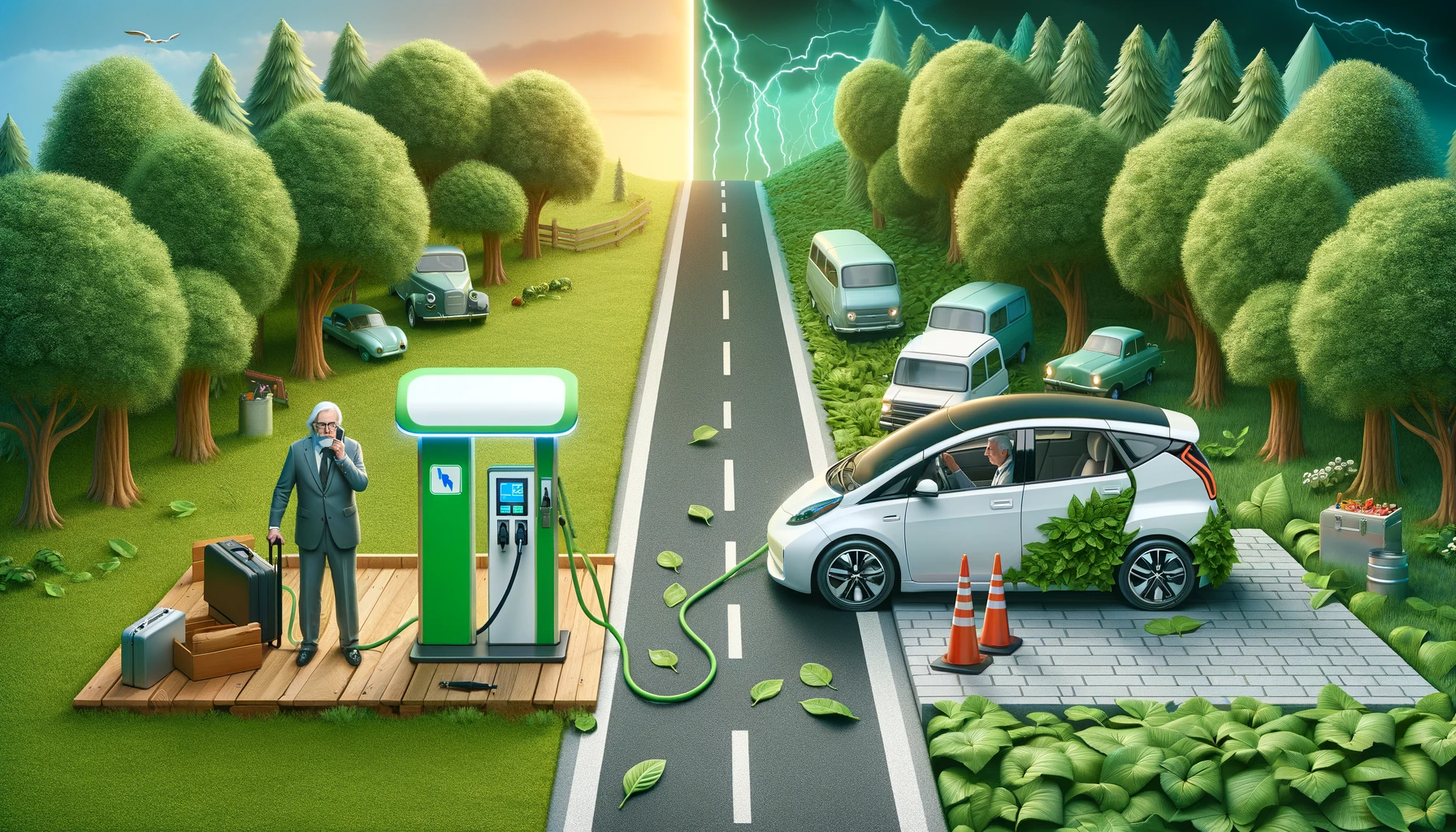Understanding Electric Vehicles and Their Impact
Electric vehicles (EVs) represent a transformative approach to transportation, operating primarily through electric power as opposed to relying on gasoline or diesel fuel. The mechanics of an electric vehicle entail utilizing an electric motor powered by rechargeable battery packs. Unlike traditional gas-powered cars, which emit harmful pollutants through tailpipes, EVs operate with zero tailpipe emissions, significantly reducing their carbon footprint. This pivotal difference underscores the environmental advantages of transitioning to electric cars, especially in light of escalating climate concerns.
Conventional vehicles, while providing undeniable convenience, have been major contributors to a myriad of environmental challenges. These cars release greenhouse gases and pollutants, such as carbon dioxide, nitrogen oxides, and particulate matter, which not only contribute to global warming but also to poor air quality. Cities worldwide often battle smog and health issues attributed to the emissions from internal combustion engines. Transitioning to electric vehicles mitigates these problems by offering a cleaner alternative that can fundamentally alter the trajectory of urban air quality and public health.
Moreover, the broader adoption of electric cars is crucial for reducing dependency on fossil fuels. By harnessing renewable energy sources such as solar, wind, and hydroelectric power to charge EVs, we can considerably lower environmental impact while advancing towards sustainable energy solutions. Notably, the shift to electric vehicles is not merely an individual choice but a collective societal movement aimed at reducing our overall carbon emissions and fostering a cleaner ecosystem. By understanding the mechanics and implications of electric vehicles, it becomes evident that this transition is essential for environmental preservation and promoting a healthier planet.
Reduction of Greenhouse Gas Emissions
The transition to electric vehicles (EVs) represents a crucial step in mitigating greenhouse gas emissions—a primary driver of climate change. A significant advantage of EVs lies in their lower lifetime emissions when compared to traditional fossil fuel-powered vehicles. This evaluation encompasses several phases: manufacturing, usage, and end-of-life processes. Each stage contributes to the overall environmental impact and highlights the benefits of adopting electric transportation.
During the manufacturing phase, electric vehicles typically have higher initial greenhouse gas emissions compared to gasoline vehicles, primarily due to battery production. However, as technology advances and renewable energy sources are increasingly employed in the manufacturing process, these emissions are expected to decline. When examining the usage phase, electric cars excel significantly. They produce zero tailpipe emissions, contributing to cleaner air, especially in urban environments where air pollution is a pressing concern. Furthermore, as the global electricity grid shifts towards renewable energy sources like wind and solar, the overall emissions associated with electric vehicle usage will continue to decrease.
When considering the end-of-life stage, electric vehicles also present a promising scenario. Innovations in battery recycling and reusability are continually evolving, which can substantially lower the environmental impact caused by battery disposal. Proper infrastructure for recycling can ensure that valuable materials from EV batteries are repurposed, thus reducing the need for new materials that often require energy-intensive extraction processes.
The collective effect of these reductions in greenhouse gas emissions clearly demonstrates how the widespread adoption of electric vehicles can combat climate change and protect vital ecosystems. Cleaner air and significantly minimized carbon footprints not only enhance public health but also safeguard the environment for future generations, paving the way for a more sustainable future. Such profound benefits emphasize the importance of embracing electric mobility as a key strategy in the global effort against climate change.
Decreased Air Pollution and Its Benefits for Wildlife
The transition from conventional gasoline-powered vehicles to electric cars has significant implications for reducing air pollution, ultimately benefiting local ecosystems and wildlife. Electric vehicles (EVs) produce zero tailpipe emissions, which means they do not release harmful pollutants such as nitrogen oxides, particulate matter, and volatile organic compounds into the atmosphere. This reduction in harmful emissions directly contributes to cleaner air quality, creating healthier environments for both humans and wildlife alike.
As air quality improves, ecosystems become more resilient. Cleaner air allows for the flourishing of plant life, which serves as the foundation of any ecosystem. Plants are crucial for oxygen production, carbon sequestration, and providing habitat and food for various animal species. With reduced air pollutants, plants can grow stronger and healthier, supporting a diverse array of species and promoting biodiversity. For instance, native bees, birds, and other pollinators benefit immensely from healthier flora, which provide them food resources and habitats free from toxic contaminants.
The impact on wildlife extends beyond just local air quality; it also contributes to the broader health of various species. Reduced air pollution minimizes stressors on wildlife, allowing them to thrive in their natural habitats without the burden of toxins. Consequently, the overall biodiversity is enhanced, creating a balanced ecosystem. Moreover, a cleaner environment fosters the restoration of habitats that may have suffered from pollution, leading to increased populations of local fauna.
In essence, every electric vehicle on the road aids in the fight against air pollution, acting as a catalyst for rejuvenating local ecosystems. As more individuals transition to electric cars, the cumulative effect of these cleaner transportation options will significantly benefit wildlife and promote a diverse and thriving natural world. This shift toward sustainability is instrumental in ensuring a healthier planet for future generations.
Supporting Renewable Energy and Sustainable Practices
The adoption of electric vehicles (EVs) has a profound connection with renewable energy sources, which serves as a catalyst for sustainable practices. As more individuals transition to electric cars, the demand for clean energy solutions, such as solar, wind, and hydroelectric power, increases. This shift toward green alternatives plays a crucial role in reducing reliance on fossil fuels and mitigating climate change, effectively transforming the transportation landscape.
Incorporating electric vehicles into daily life not only benefits the environment but also fosters advancements in sustainable infrastructure. The rise in EV utilization encourages the development of supporting technologies, such as smart grids, which can efficiently distribute renewable energy generated from various sources. This synergy enhances the overall efficiency of energy consumption, enabling the use of clean energy to charge EVs and, consequently, reducing carbon footprints significantly.
Moreover, electric cars promote sustainable transport solutions, and their integration within public transport systems facilitates a shift toward environmentally friendly commuting options. This transition encourages shared mobility services, which aim to minimize the number of individual car journeys and promote a robust public transport network. As a result, urban areas experience reduced congestion and improved air quality, leading to healthier communities.
The economic implications of this transition are equally noteworthy. The transition to electric vehicles not only creates opportunities in the renewable energy sector but also stimulates innovation in battery technology and charging infrastructure. As electric vehicle adoption rises, investments in research and development are likely to yield groundbreaking innovations that further improve energy efficiency and reduce costs. Additionally, new jobs in sustainable practices will be generated, contributing to an eco-friendly economy.


No responses yet